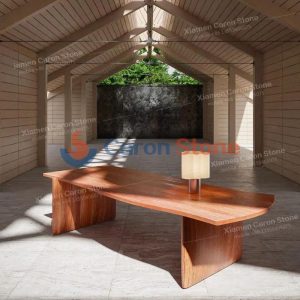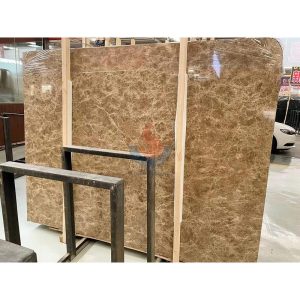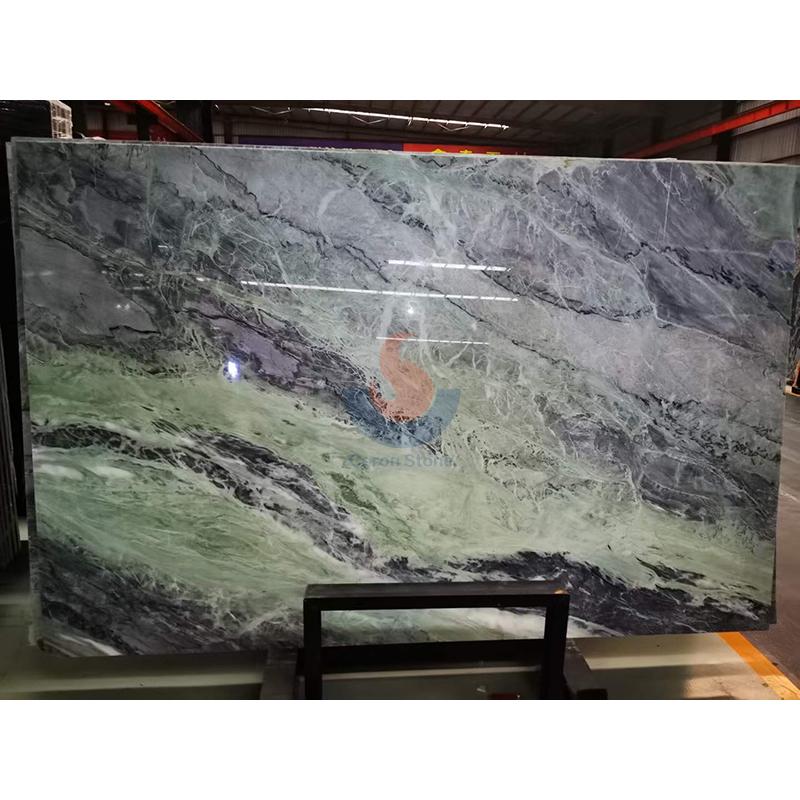Marble, this ancient building material, records the changes of the earth with its unique color and texture. Marble will nevertheless also undergo age and color changes with time. Every trace of this technique marks time, much as marble tells its own tale. This article will take you into the world of marble, explore its color changes and aging process, and how we understand and protect this natural wonder.

Luxury modern red travertine meeting table
1. The mystery of marble color and the mark of time
The color of marble is the most intuitive business card given to it by nature. Marble’s hue changes constantly from white as snow to deep as night; each tint tells a different geological tale. Still, marble’s color is not fixed. Over time, the color of the marble surface will change due to factors such as oxidation, pollution and light. Though little, these changes really capture the relationship between marble and the surroundings and act as a chronicle of years.
2. The aging process of marble and the laws of nature
The aging of marble is a slow and complex process. It calls for several elements including biology, chemistry, and physics. Physical aging mostly shows up as wear and flaking of the stone surface; chemical aging results from the oxidation and breakdown of minerals within the stone; and biological aging is brought about by microbe development and metabolism. Following the irrevocable laws of nature, these aging processes subtly alter the appearance and texture of marble even if they are difficult to identify.
3. Scientific analysis of marble color changes and environmental interaction
Scientists have conducted in-depth research on the color changes of marble through various advanced technologies, such as spectral analysis, microscopic observation and chemical analysis. They discovered that the mineral composition and structure clearly correlate with the color shift of the marble. For example, the oxidation of iron elements will cause yellow or brown spots on the surface of marble; while the deposition of organic matter will make the marble surface darker or dirty. These color variations not only highlight marble’s natural qualities but also capture its interaction with the surroundings.
4. Maintenance and restoration of marble aging: a combination of art and science
Marble is aging, hence we are not helpless. By means of professional care and restoration techniques, we can postpone the aging process of marble and even bring back its natural color and gloss. For example, regular cleaning and polishing can remove dirt and wear on the marble surface; using professional stone protective agents can prevent the intrusion of moisture and pollutants; and chemical or physical methods can remove spots and stains on the marble surface. Apart from providing protection for marble, these maintenance and restoration projects constitute artistic production.
5. Future research on marble color and aging: exploration and innovation
Our knowledge of marble color and aging processes changes and becomes more and more complex as science and technology advance. Future studies could concentrate on the following: first, developing more exact detection technology to monitor the color changes of marble in real time; second, investigating more environmentally friendly and effective maintenance materials and methods; third, studying the interaction between marble and the environment to better predict and control its aging process. These research projects will not only enable us to preserve marble but also advance allied scientific disciplines.

Emperador light marble price golden emperador marbleBeautiful maron light emperador marble tile
The eternal charm of marble and the dialogue with time
Marble, an ancient building material, may change color and undergo aging, yet its timeless appeal has not lessened. Conversely, these age and alterations have given marble more rich meanings and stories. Through scientific research and reasonable maintenance, we can better protect and utilize this natural wonder, allowing it to continue to shine with its unique brilliance over time. The color change and aging process of marble is not only a manifestation of natural laws, but also a crystallization of human wisdom. Let’s listen to the conversation between marble and time with wonder and sense of endless appeal.





